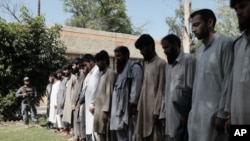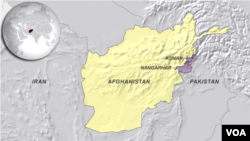The United States military, in partnership with Afghan forces, has promised to eliminate Islamic State terrorists in Afghanistan this year and contain a resurgent Taliban, citing recent battlefield successes against the two groups.
U.S. counterterrorism airstrikes in support of Afghan operations against IS strongholds in the eastern border provinces of Nangarhar and Kunar have killed more than 200 IS militants in March alone, Navy Captain Bill Salvin told a joint news conference Thursday in Kabul.
In March, Slavin told VOA's Afghan Service that the goal in 2017 is to defeat IS in Afghanistan.
Salvin speaks for both U.S. and NATO's Resolute Support military missions in the country. Salvin reiterated there is no U.S. military intelligence available suggesting IS is present elsewhere in Afghanistan.
The Middle East-based terrorist group launched its extremist operations in the Afghanistan-Pakistan region two years ago, naming it Islamic State Khorasan, or IS-K, and basing it in volatile southern parts of Nangarhar.
Salvin, however, said that counterterrorism operations, with Afghan forces in the lead, have since reduced IS-controlled territory by "two-thirds" and the number of its fighters by "more than 50 percent."
He estimated that currently there are fewer than 800 IS loyalists in Afghanistan and they remain under military pressure.
But Analysts caution that U.S. and Afghan officials may be overly optimistic when speaking of containing IS's spreading influence in Afghanistan.
"Ultimately, we should applaud U.S. efforts to cut down the presence of IS fighters in Afghanistan," said Michael Kugelman, a South Asia specialist at the Woodrow Wilson Center in Washington. "But the broader problem is the ideologies of hate that keep IS strong. Taking aim at the ideological drivers of IS will be very difficult."
U.S. training
The U.S. spokesman also shared details about efforts to train and equip Afghan National Defense and Security Forces, or ANDSF, under NATO's mission to enable them to fight the Taliban more effectively this year.
The recent introduction of new planes continues to enhance the Afghan Air Force and has led to "a dramatic improvement in the ability of the ANDSF to conduct combined armed operations across the country," Salvin noted.
"The Afghan air force is flying more missions than the U.S. Air Force and the Afghan pilots are making a critical difference for the Afghan troops on the ground. … during the winter, thousands of [Afghan] soldiers have completed additional training, many of these soldiers are already back in the fight."
Speaking for his forces, Afghan Defense Ministry spokesman Dawlat Waziri told reporters that since launching springtime counter-insurgency offensives in mid-March, Afghan forces have killed more than 1,000 Taliban insurgents, including dozens of their commanders, and destroyed scores of hideouts.
Waziri added that a new military offensive, called Khalid, has also been unleashed in 14 of the country's 34 provinces, where months of insurgent activities have led to a deterioration in security conditions.
Salvin said that NATO's train-advise-and-assist teams are also supporting the Khalid operation.
"This operation will isolate insurgent strongholds across the country so that the ANDSF can protect population centers, maintain flexibility to reposition and resupply forces based on conditions on the battlefield and deny resources and illicit funds to insurgent groups," Saldin said.
Taliban support
Waziri and Salvin again criticized Russia, Iran and Pakistan for maintaining overt contacts with, and secretly supporting, the Taliban.
"Support to reconcile the fighting in Afghanistan, that support needs to go to the Afghan government. Supporting the Taliban, or providing meeting space, or providing overt legitimacy to the Taliban is ultimately not helpful," cautioned Salvin.
Moscow and Tehran have publicly acknowledged their links with the insurgents, insisting such links are meant only to encourage the insurgents to engage in peace talks with the Afghan government to end hostilities.
For their part, Pakistani officials deny the presence of Taliban sanctuaries on their land, insisting insurgents have long relocated themselves to Afghan territory currently under their control, although Kabul and Washington dismiss Islamabad's assertions.
The U.S. military estimates that the Afghan government is in control of less than 60 percent of its territory, while the Taliban control 10 percent and the rest is contested. Most of the poppy-growing Afghan province of Helmand is controlled by insurgents. Helmand is among several provinces bordering Pakistan.
VOA's Noor Zahid contributed to this report.






